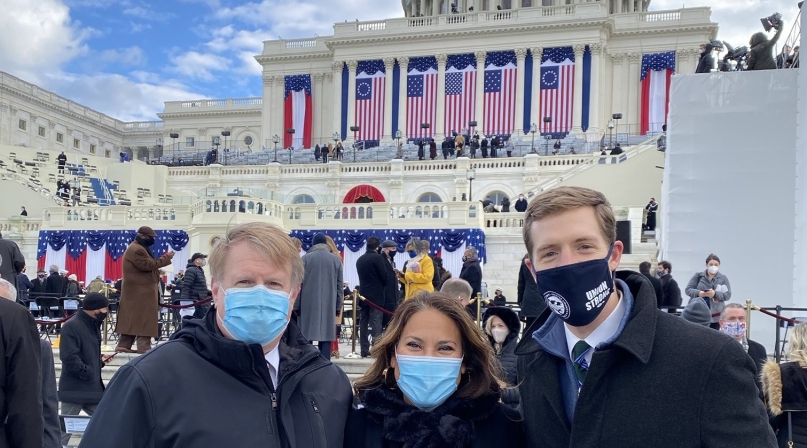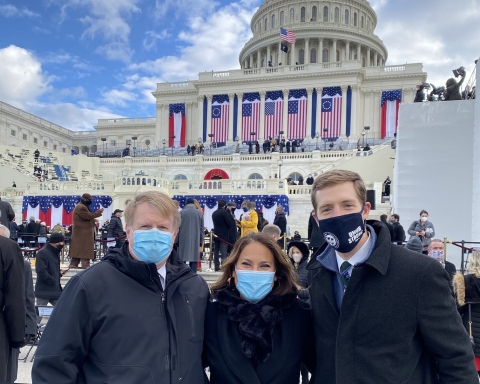Counties enhance security protocols following Inauguration Day threats
Author
Upcoming Events
Related News

Key Takeaways
Last week, Allegheny County, Pa. Executive Rich Fitzgerald arrived in Washington D.C. one day prior to Inauguration Day to a very different atmosphere than the last ceremony he attended in 2013.
This time, Fitzgerald saw an abundance of armored vehicles and bomb-sniffing dogs in addition to the large presence of law enforcement officials and National Guard members who were stationed in the nation’s capital following the Jan. 6 riots at the U.S. Capitol.
With COVID-19 numbers reaching all-time highs and reports of potential threats of violence on Inauguration Day, health and safety concerns were a priority for both President-Elect Joe Biden and Vice President-Elect Kamala Harris’s swearing-in ceremony and in counties nationwide.
Fitzgerald received a COVID-19 test before attending the ceremony with Pennsylvania Rep. Conor Lamb, who was only allowed to bring one guest.
“I thought it was important for me to be here representing southwestern Pennsylvania and the peaceful transfer of power,” Fitzgerald said.
As an added precaution, Fitzgerald brought his security detail to D.C.
“I’ve never really taken them on an overnight trip to D.C. or Harrisburg… but this time it was recommended that I take them with me,” he said.
Back home in Allegheny County, Fitzgerald described the collaborative efforts among the FBI, U.S. Attorney’s Office, state, city and county police and sheriff’s deputies to monitor potential threats, develop intelligence and review social media posts to address any safety concerns.
Other county law enforcement agencies also had a presence at Inauguration Day to assist with security efforts during the event. The D.C. Metropolitan Police Department (MPD) requested assistance ahead of the ceremony and 40 deputies from the Mecklenburg County, N.C. Sheriff’s Office responded.
“We are proud to be called upon for this prestigious event and have been coordinating and planning with MPD before sending our team to Washington D.C.,” Mecklenburg County Sheriff Garry McFadden said.
Other county public safety officials took precautions in their own communities including in Buncombe County, N.C., where members from the sheriff’s office participated in a briefing offered by the FBI to determine if there were any threats to the county.
Buncombe County law enforcement officials agreed on an enhanced community security plan which included heightened presences at the courthouse and other city and county locations.
Right outside of D.C., Arlington County, Va. closed its courthouse and government center as well as government offices, courts, libraries and facilities for Inauguration Day.
The Arlington County Police Department also deployed increased resources throughout the county, collaborating with local, state and federal law enforcement and intelligence agencies to stay connected and informed about any safety concerns.
In Polk County, Iowa, home to the state capital of Des Moines, officials took extra precautions and boarded up windows of the historic courthouse, Polk County Sheriff’s Office Public Information Officer Ryan Evans said.
With the historic courthouse currently under renovation, the sheriff and board of supervisors decided to take the precaution in the case of any incidents.
“It’s better to be prepared than surprised,” Evans said.

Attachments
Related News

Information-sharing bill could protect court workers
The Countering Threats and Attacks on Our Judges Act could provide more than 30,000 state and local judges with access to security assessments, best practices and a database of threats made against colleagues in the justice field.

California counties fight agricultural crime
Sheriffs' offices and prosecutors in California's central valley make specific efforts to prevent and prosecute crimes against the agricultural community.

After historic winter storms, counties assess response
Counties in states that rarely receive much winter weather are assessing their responses to the January storm that left many covered in snow and ice.
